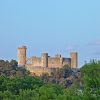
Ensaïmada
The ensaimada is a pastry product from Mallorca, Balearic Islands, Spain. It is a common cuisine eaten in southwestern Europe, Latin America and the Philippines. The first written references to the Mallorcan ensaïmada date back to the 17th century. At that time, although wheat flour was mainly used for making bread, there is evidence that this typical pastry product was made for festivals and celebrations.
The ensaïmada de Mallorca is made with strong flour, water, sugar, eggs, mother dough and a kind of reduced pork lard named saïm. The handmade character of the product makes it difficult to give an exact formula, so scales have been established defining the proportion of each ingredient, giving rise to an excellent quality traditional product. The name comes from the Spanish word saín, which means lard. The pastry apparently has a Jewish origin, deriving from bulemas, using lard instead of olive oil as a means of escaping the suspicions of the authorities during the Inquisition.
In Mallorca and Ibiza there is a sweet called greixonera made with ensaïmada pieces left over from the day before.


